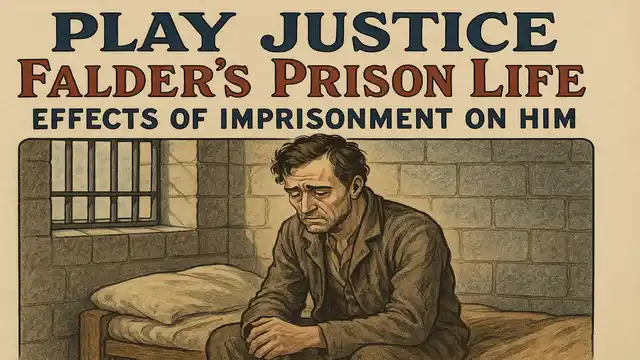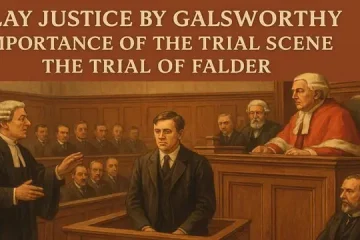Falder’s Joining the Highly Demoralised Prison Life:
In the play Justice, Falder’s prison life effects of imprisonment on him. Falder joined the luckless crew of the ill – starred ships called prisons. Prison life is inexplicable, painful, agonising and demoralising particularly for a highly emotional and tender hearted young man like Falder who committed the act of forgery under the sympathetic and emotional pressure of making welfare of a distressed lady. He does not have the hardness of features and callousness of heart. Hence the prison life leaves hard impacts on his mind and heart.
Falder’s Undergoing the Torture of Solitary Confinement:
Solitary confinement is the greatest torture to Falder. With all his efforts, it becomes very much unbearable for him to face the greatest torture or solitary confinement. He loses all his patience. He says to Cokeson, “A day shut up in your cell thinking and brooding as I do, it’s longer than a year outside.”
Due to knowing the temperamental weakness and highly sentimental nature of Falder, Cokeson tells the Governor of the prison, “I am thinking of the future. If he is to be kept there shut up by himself, without a cat to keep him company, it’ll do him harm.” Cokeson further says that he would not convict even his dog to solitary confinement.
Unnerving and Shattering the Whole Personality of Falder:
Solitary confinement completely shatters the mind and heart of Falder. The doctor examines him physically and mentally, but ignores the psychological and emotional life of Falder. The doctor says, “He has lost no weight since he has been here. His mind is all right so far. He is nervous, rather melancholy.” After examining Falder second time, the doctor says, “He hasn’t lost weight nothing wrong with his eyes. His pulse is good. Talks all right.” The doctor puts him into examination on the basis of scientific observation not on the basis of emotions and feelings.
Falder’s Feeling Nervous and Desperate:
Falder feels that he has been knocked of time. He feels much nervous and desperate to see the faulty, defective, unsocial, callous, inhuman, system of law which only emphasises and stresses upon the theoretical aspects of law. It leaves no room or consideration for human compassion, suffering and adverse circumstances being confronted by the innocent criminals like him. He tells the Governor: “Everything seems to get such a size. I feel I’ll never get out as long as I live.” He cannot get rid of this thought. This keeps him restless and excited.
Falder’s Becoming Victim of Fits of Lunacy:
Falder is startled into alarm at the least sound outside his cell. He tries harder to hear something that is going to outside. On the Christmas evening all the convicts get highly excited. They bang at their doors. The banging sound travels from cell to cell and hypnotises Falder. “He springs suddenly upright – as if at a sound – and remains perfectly motionless. Then turning abruptly, he begins pacing the cell, moving his head, like an animal pacing its cage.”
When he feels very lonely, he picks up the lid of one of his tins and peers into it, as if trying to make a companion of his own face. Our hearts melt with pity at this mental and emotional distress of Falder in the prison. Falder’s life becomes full of inexplicable horrors in prison which he cannot forget even long after his -release.
Complete Downfall of Falder’s Life and Career:
The chariot wheels of justice rolled over him and rained him altogether in perpetuity. Imprisonment had long – range effect on Falder. It had completely shattered his nerves and ruined his life and career. When he entered the jail he was one person, by the time he left, he was another. After his release from the prison, he told James, “It has knocked me out of time. This is I mean, I am not what I was.”
Falder cannot surmount the horrors of these days even after his release . He tells Cokeson, “The fact is, I seem to be struggling against a thing that’s all round me. I can’t explain it; it is as if I was in a net ‘ as fast as I cut it here, it grows up there.” The horrors of prison – life keep haunting him day and night . He carries his ghost with him wherever he goes. He felt as if he had been caught in an endless web of hard situations from which he could not break away.
The Hostile Attitude of Society:
Even after release from prison, he felt so demoralised that he could not find any peace and security in the world outside. The hostile attitude of the society made his agonies all the more grievous. When he came out of the prison, he decided to start a new life. But society did not let him do so. He got a job with the help of prison authorities.
He worked there peacefully for some time but then his colleagues in the office could anyhow came to know his past history and imprisonment. They started condemning, despising and mocking at him. They made it impossible for him to hold on with his job.
He tried at several places too but met with the same scorn. Even his own brother – in – law did not desire to meet him. He was humiliated everywhere. He remained without work and food for several days. Nobody showed sympathetic attitude for him.
Law’s Branding him a Confirmed Criminal:
The rolling chariot – wheels of law paid no heed to his naturally merciful and tender nature and the adverse circumstances facing him. The state of his excited feelings causing temporary lunacy for four minutes led him to commit a casual offence for a noble cause. For this he was branded habitual offender and a confirmed criminal.
Law’s Not Sparing Him Even After Release:
Even after his release from prison the law did not spare him. He was required to report to the police about his whereabouts regularly. But Falder failed to do so. Hence the Police Sergeant come to arrest him. He became desperate and wanted to escape from his hold. In this attempt he fell down from the roof, broke his neck and died on the spot.
The Role of Law in Ending Falder’s Life:
This was Falder’s last escape from the hold of law. The prevailing system of law and justice brought about the tragic end of a young tender soul. It was an ill – starred life – story. The rolling wheels of the chariot of justice completed their work with his death.
When he dies we are reminded of the concluding remark of Frome’s plea for defense: “The rolling of the chariot – wheels of justice over this body began when it was decided to prosecute him. We are now already at the second stage. If you permit it to go on to the third, I would not give that for him.” And unfortunately the third stage was allowed to overtake him and this ended with his tragic death.




